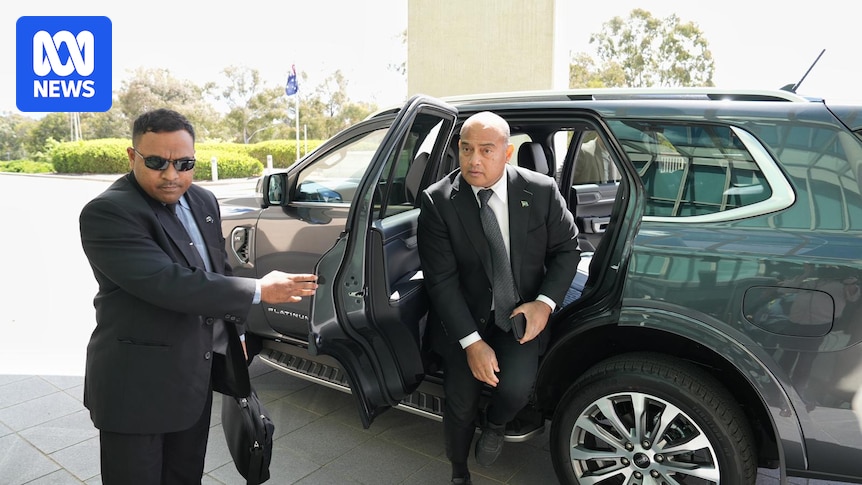
Nauru’s President, David Adeang, made an unannounced visit to Parliament House in Canberra, raising eyebrows amid ongoing scrutiny over a controversial security contract in the Pacific Island nation. This visit occurred less than two weeks after the first members of the NZYQ cohort were quietly deported to Nauru, a move that has drawn significant criticism.
The clandestine nature of President Adeang’s trip, which took place just before 3 PM today, was underscored by his refusal to answer questions from the media, including the ABC. His brief half-hour stay at Parliament House included meetings with key Australian ministers but was shrouded in secrecy, with no public announcements made by either government.
Secretive Meetings and Political Reactions
Reports indicate that President Adeang met with Home Affairs Minister Tony Burke, alongside visits to Foreign Minister Penny Wong and Pacific Minister Pat Conroy. The visit also included a dinner in Canberra, further fueling speculation about the discussions held behind closed doors.
Civil society groups, along with opposition parties such as the Coalition and the Greens, have criticized the government’s dealings with Nauru. They accuse the Australian Labor government of lacking transparency, particularly regarding the resettlement agreement for the NZYQ cohort.
Concerns Over Transparency
Greens Senator Sarah Hanson-Young voiced her concerns, demanding an explanation for the high-level visit’s secrecy. She criticized the government’s approach, stating,
“This government does have a growing problem with secrecy, a growing problem with transparency. They seem to be allergic to transparency and openness.”
Senator Hanson-Young further condemned the use of Nauru as a “prison island,” arguing that Australia is shirking its obligations to those seeking safety and protection by outsourcing detention.
The NZYQ Cohort and Financial Implications
The deportation of the first NZYQ cohort member to Nauru last month marked the beginning of a broader plan to relocate hundreds of convicted criminals to the island. This arrangement comes with a hefty financial commitment from Australia, which agreed to pay Nauru $408 million upon the first deportee’s arrival. Additionally, an annual payment of up to $70 million is set to continue for the next 30 years, contingent on the number of transferees.
Allegations of Security Contract Mismanagement
Adding to the controversy are allegations reported by Nine newspapers that the Finks outlaw motorcycle gang secured a lucrative contract to provide security for former detainees on Nauru. These claims have sparked further debate over the integrity of the operations and the potential misuse of taxpayer funds.
The prime minister addressed these concerns, stating, “The minister will respond to that, but I note that those issues, as I read them, come from a period before we were in government.”
Looking Ahead: Implications and Consequences
The secretive visit by President Adeang and the subsequent revelations about the security contract have intensified scrutiny on the Australian government’s dealings with Nauru. As the situation unfolds, questions remain about the transparency and ethical implications of the agreements in place.
Moving forward, the government faces mounting pressure to clarify its position and address the concerns raised by opposition parties and civil society groups. The handling of the NZYQ cohort and the associated financial commitments will likely continue to be a contentious issue in Australian politics.
As the debate continues, the implications for Australia’s immigration policies and its international relationships, particularly with Pacific Island nations, remain significant. The coming weeks may provide further clarity as the government responds to the growing demands for transparency and accountability.





